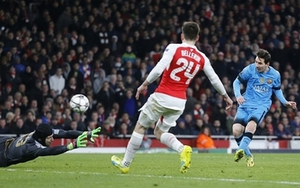
The sense of an ending gripped the Emirates Stadium. Barcelona have Messi, Arsenal have Olivier Giroud, a good centre-forward but not Champions League winning calibre. The last 16 looks like the end of the road again for Arsenal in Europe. The trip to Catalonia next month appears ceremonial.
“Shut up,” shouted Arsenal fans at the giddy Catalan radio announcer to our right when Arsenal went behind. His burbling delivery was hurting their ears as much as Messi had just hurt their hearts.
But there is no shutting up Messi and his co-conspirators for a full 90 minutes. Barcelona goals are like death and taxes: there is no avoiding them, even for the team’s household names. The wiping out of all that hard work had dire consequences. First Suàrez hit the post, then Flamini fouled Messi in the box and allowed the little giant to double Barcelona’s lead.
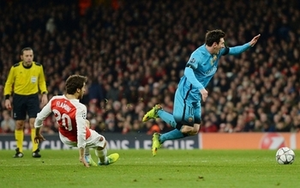
Wenger’s red and white Maginot Line is reserved for those rare occasions when Arsenal expect to see less of the ball than the opposition.
In the Premier League only Manchester City force the Arsenal manager to rip up his principles to frustrate the other team. This is not a concession that Wenger would have made three seasons ago. But how else to deal with having the devil’s trident of Messi, Neymar and Suàrez poked up your nose?
Who dominated at the Emirates?
There is no other way. Arguably the greatest attacking trio since Alfredo Di Stefano, Francisco Gento and Ferenc Puskas in the illustrious Real Madrid sides of the Fifties and Sixties are not open to the meet-fire-with-fire approach. In such a battle they would burn your eyebrows off.
Even with Mesut Özil and Alexis Sánchez to call on, Arsenal lack the majesty to engage in a straight talent contest with three megastars who had scored 109 Champions League goals between them in 149 fixtures, with Messi accounting for 80 of those in 102 outings.
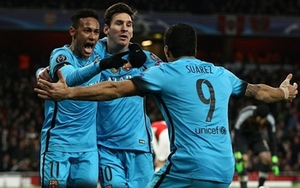
These phenomenal statistics are further burnished by the understanding that runs between the three: the willingness to co-operate for the collective good. In an age when footballers are one-man corporations with vast entourages, this dilution of ego is incredibly hard to achieve. They are a Best, Law and Charlton for the Xbox age, but without the political tensions you would expect.
Messi saw that Suàrez’s arrival made his own life better, not worse, as Zlatan Ibrahimovic’s had. Neymar saw that playing with Messi and Suàrez would hasten his ascent to world No 1. And Suàrez himself still has the grateful look of one who still struggles to believe his ultimate dream came true and is loathe to waste the opportunity.
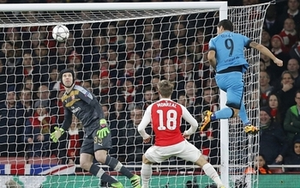
As the Brazilian great, Zico, said recently: “The trident is fantastic because they play as a team and suit each other perfectly.” Or as Wenger said before the game: “They have a great solidarity. When you see someone like Messi, who could score his 300th La Liga goal, pass a penalty to Suàrez, that means there’s really something in there.”
So there was no choice for Wenger but to acknowledge the brilliance of the force arrayed against him, not only with the front three but Andres Iniesta as the purveyor of fine goods to royalty, as he has been for so long.
Glimmers of hope open eventually for the opponents of all great teams.
Barcelona's attacking stats
Barcelona’s pure tika taka generation became vulnerable to set pieces and power through the middle, which forced Luis Enrique to shift the balance, and the club to buy Suàrez, an authentic centre-forward.
Arsenal showed for long periods here that the current constellation really can be defied, not just by pulling men behind the ball (as any team could do) but presenting a tight, alert, aggressive defensive formation to stop Barcelona sweeping the ball around the edge of the penalty area.
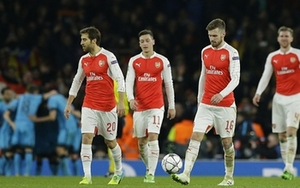
“What do I say to Messi, Suàrez and Neymar? Abracadabra. And then the magic sparks,” claimed Luis Enrique, the Barca coach. Abracadabra failed to work for much of this game, because Arsenal refused to be dazzled by the three amigos and kept up a constant attacking threat.
How many times have we said, though, that Arsenal’s good approach work is not producing the desired results?
Messi, 28, scored his 300th La Liga goal last week; he now has 82 goals in 103 Champions League fixtures. Aaron Ramsey, who seems to have the yips in front of goal, did a good job of hunting him down.
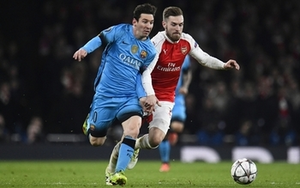
The scorecard, however, will show that Messi damaged Arsenal on the break and again when Mathieu Flamini marked his arrival in the game by giving away a penalty.
Arsenal’s early defensive block was often impressive. But their mental block in front of goal was ruinous. It was the sign of weakness Messi needed. You just knew he was going to pounce
Arsenal vs Barcelona timeline February 23 2016
- Telegraph